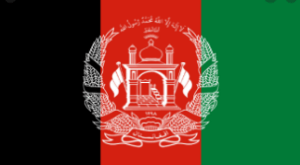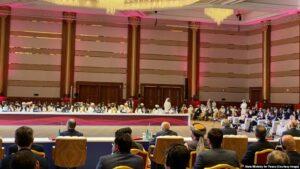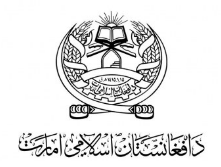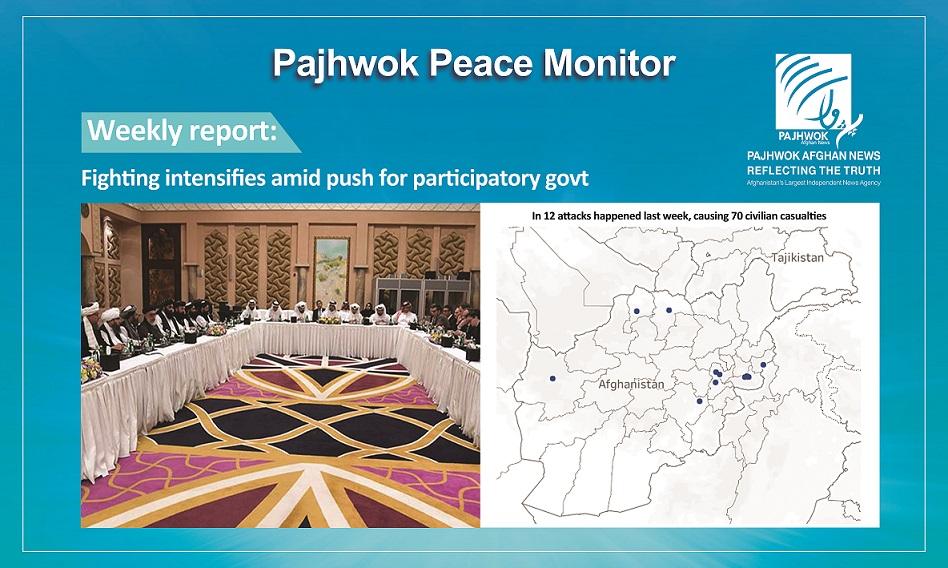KABUL (Pajhwok): During his last week’s trip to Takijistan, Wolesi Jriga Speaker Mir Rahman Rahmani accused the Taliban of not being sincere about peace and ending the war. He claimed the Taliban wanted power, not peace.
Rahmani asked the Tajikistan government to mount pressure on the Taliban to ensure a positive outcome of the peace process. He warned if NATO left Afghanistan irresponsibly, fighting would intensify in the country.
Also last week, President Ashraf Ghani asked Turkey to play its role in developing regional consensus on the Afghan peace process. During his speech at the ECO platform, Ghani said Pakistan could play a crucial role in bringing peace to Afghanistan. The neighbouring country would suffer the most if ongoing peace efforts failed.
The president stressed the need for an organised political change in Afghanistan, suggesting that a free and fair presidential election should take place under the watch of the international community.
Last week, the most violent for civilians, the Taliban said any alternative to the Doha agreement would be a failure at a time when the US discussed a participatory government with Afghan politicians and officials. A well-placed official source, however, said no strategy should be put on the table in the absence of the government.
Complex situation:
Some politicians have supported Khalilzad’s new strategy. The Taliban said the US has not been fully committed to Doha Agreement but the accord was still moving in positive direction.
Afghan officials accused the Taliban of not being sincere to the peace process and termed the Doha Agreement useless for peace in Afghanistan. They believed that a golden chance was available for peace and stressed that power should be transferred through election.
A violent week:
Besides fresh efforts for peace, last week was more violent for civilians than previous weeks.
Attacks and civilian casualties:
Pajhwok Afghan News collected figures for civilians killed and wounded in recent weeks through its own and other media outlets reports.
Reports show that last week — from previous Friday 12:00am to last Friday 12:00am — 22 people were killed and 48 others injured in 12 attacks in Herat, Nangarhar, Ghazni, Kabul, Balkh, Kunar and Logar provinces.
Among those killed and injured were 18 male and four women while 34 male, two female and three children were injured.
Thirty-seven people suffered casualties in face to face attacks, 17 in targeted attacks and 16 others in blasts. Of total 12 attacks, 11 were unclaimed while in Jawzjan province local officials acknowledged that a man was killed by security personnel.
According to Pajhwok’s findings, 12 people were killed and 37 others injured in 12 attacks in the previous week while 13 people were killed and 25 others injured in 13 attacks a week before the previous week.
But Taliban spokesperson ZabihullahMujahid claimed last week 26 people were killed and eight others injured in local and foreign security forces attacks in nine provinces — Kapesa, Ghazni, Zabul, Logar, Kabul, Faryab, Kunar, Nangarhar and Jawzjan.
National Security Council spokesperson Ramatullah Andar when asked about civilian casualties in the previous week as well as last week but he did not respond.
The warring parties also suffered casualties last week during clashes but Pajhwok did not publish them due to lack of accurate information.
What is happening internationally?
Last week, Russia, Pakistan and Qatar officials expressed their views on Afghan peace process, but this week the important news was Khalilzad’s new strategy about reconciliation process and sharing of the strategy with Afghan politicans.
According to reports Qatar Military Commander Gen. Saeed Hassn Mohammad Al Khayar met Pakistan Army Chief Gen. Javed Qamar Bajwa in Rawalpindi and discussed with him the Afghan peace process.
Russian National Security Council Secretary NicholiPatroshivemet Foreign Minister Mohammad Hanif Atmar and made it clear and Moscow did not support the revival of Islami Emarate in Afghanistan and it was premature that the Taliban leaders’ names should be removed from the black list.
This comes at a time when earlier Russian Special Representative for Afghanistan Zamir Kabulov said that Taliban remained committed to Doha Agreement and demanded the US to show full compliance with the agreement.
Pakistan Ambassador in Kabul Mansour Ahmad Khan during a meeting in Islamabad on March 1 supported US move to review Doha Agreement and said situation in Afghanistan did not allow foreign forces to withdraw and stressed more consultation with the Taliban in this regard.
Last week, US National Security Advisor published US short term security guideline. The strategy underlined the need that US may not remain part of its long-term conflict in which thousands of its forces had been killed. The strategy stressed a responsible end to the conflict in Afghanistan in which the country never becomes safe haven for terrorists again.
But Khalilzad’s trip to Kabul made headlines
Besides Afghan officials, the US chief negotiator also met with some influential and relevant Afghan politicians and discussed the participatory government strategy with them. He also discussed other options related to peace and stability in Afghanistan.
A senior US State Department official has confirmed discussions on several options including the formation of a participatory government in Afghanistan during ZalmayKhalilzad’s recent visit.
The discussions took place at a meeting under auspices of the United Nations and high level Afghan leaders during the US special envoy ambassador Kahlilzad visit to Kabul.
The State Department official said so far these options had not been discussed with the Taliban. The official said these discussions were based on the US administration review of the US-Taliban peace deal.
The official said “We proposed several issues that could accelerate the peace process to increase the UN role in Afghan peace process”.
President Ghani also met Deborah Lyons, UNAMA head in Afghanistan, and discussed matters related to peace process.
Govt actions, statements on peace:
Last week, Afghan government officials explained their efforts for developing regional consensuses on peace process and accused the Taliban of not being sincere for peace. The governament termed Doha Agreement as influential for peace and stressed the transfer of power should take place through election.
accused the Taliban of not being sincere for peace. The governament termed Doha Agreement as influential for peace and stressed the transfer of power should take place through election.
The government cleared that no strategy should be implemented in the absence of Afghan government.
On the first anniversary of Doha Agreement, Afghan National Security Council spokesperson RahmatullahAndar said the accord failed to end war in Afghanistan.
“Afghans’ hopes and aspirations from Doha Agreement were not fulfilled. The agreement only ensures ceasefire with the US,” he said.
Doha Agreement was signed last year on February 29.
Under the agreement, foreign forces shall leave Afghanistan in 14 months, the Taliban will not allow the use of Afghanistan soil for attacks against the US and its allies, the Taliban and Afghan government prisoners would be released and intra-Afghan talks would begin.
What is going on in Doha?
The governament’s negotiating team’s member, Fawzia Kufi, told Pajhwok Afghan News that Zalmai Khalilzad met with the team’s chief negotiator on last Thursday.
team’s chief negotiator on last Thursday.
She did not provide details about the meeting but another member of the team, who wished to go unnamed, said that they had a productive meeting with Khalilzad.
The source said there were no concerns about new proposals about the government and Khalilzad did not discuss about it with their team. However, the official said that Khalilzad stressed on a strong regional consensus for the Afghan peace process and a higher role of the UN in the process.
Dr. Mohammad Naim, Taliban’s spokesman for the group’s Qatar office, in a series of tweets said that the two sides met in Doha on Friday evening.
He said that the Taliban’s head for its political office and the group’s deputy leader, Mullah Abdul Ghani Bradar, the group’s chief negotiator, Sheikh Abdul Hakim Haqqani and some other members of the negotiating team met with Khalilzad who was also accompanied by NATO’s Resolute Support Mission commander, Gen. Scott Miller.
Both sides discussed the current situation of Afghanistan, accelerating peace process and making dialogues more effective, Naim added.
Two weeks back, after a long delay, Taliban and government negotiating teams held a new meeting which was a good news for the people of war torn Afghanistan. The two sides resumed intra-Afghan talks and discussed the agenda of negotiations. No more meetings held between the two teams after that.
Najia Anwari, spokesperson for the Ministry of Peace Affairs, said Taliban and government delegations had met several times last week. The meetings were focused on technical issues and evolving certain mechanisms. The two sides worked with supporting countries.
Pajhwok asked Taliban’s spokesman, Dr. Mohammad Naim, government’s negotiating team spokesman and member and Ahmad Nader Naderi about the delay in meetings, but none provided any explanation.
Taliban’s activities and statements:
Taliban released 53 prisoners of the governmet last week. The group said that despite the US did not carry its part of the Doha agreement properly, but the accord was moving towards a positive way and there was no better alternative to it.
agreement properly, but the accord was moving towards a positive way and there was no better alternative to it.
On the one year anniversary of Doha agreement, Taliban on February 28 in a statement said that despite there were problems regarding implementation of the accord, but it was still effective.
They said that they were committed to the agreement but accused the US of not discharging its own resonsibiltiy towards the accord. The Taliban said that the agreement was an effective solution for Afghan peace, aksing the US to stay committed to it.
The group said that the UN Security Council, Qatar and all countries and international observers who had attended the signing ceremony of the agreement, had the responsibility of full implementation of the accord and they should fulfil it.
They say the agreement was the only solution for the Afghan crisis and seeking any other alternatives would mean failure of all efforts so far done in the peace process.
Parties and civil society on peace:
Last week, some political figures expressed support for the new plan put forward by Khalilzad.
Hezb-e-Islami leader Gulbuddin Hekmatyar recently said that it was clear from the outset that talks between the “Kabul government and the Taliban” in Doha would end inconclusively and would not yield any results.
According to him, the delegation from Kabul to Doha was part of the “Presidential Palace delegation, which includes the government’s political opposition but not those opposed to the palace policies, as well as parties that do not agree with the government’s policies.
“We agree that a new and practical foundation for negotiations should be laid,” he added. All influential political parties, at the level of leaders,should be part of the peace talks with two main topics of discussion: 1. Ceasefire. 2- Establishing an interim government acceptable to all parties.
Mohammad Yunus Qanuni, a former vice president and member of the Jamiat-e-Islami party, told a gathering in Kabul that the ongoing peace process would be shaped by a new roadmap.
He said the peace talks in Doha could not suceed absent national, regional and international consensus.
Qanuni added that the ongoing peace talks should have three parties — the government, the Taliban and the people.
Ahmad Zia Massoud, another former vice president and a member of the Jamiat-e-Islami party, said an interim government should be formed for peace and ceasefire.
He said the Taliban would not call a ceasefire in the presence of incumbent President Mohammad Ashraf Ghani, but would do so with the formation of an interim government. He said the issues should be resolved in a constitutional amendmen through a Loya Jirga.
Massoud, referring to Khalilzad’s proposal for an inclusive government, said the international community was also considering convening a meeting of prominent political figures on peace in Afghanistan.
Outcome:
The United States raised the issue of an “inclusive government” in Afghanistan, backed by some politicians, But Afghan government officials insisted on an electoral transition.
The Doha Accord was not beneficial and that no drafts should be put forward in the absence of the Afghan government they said. The Taliban have previously called any alternative to the Doha Accord a failure.
This week, a Pakistani official called the withdrawal of foreign troops from Afghanistan “unacceptable” and Russia said the return of the “emirate” to Afghanistan was unacceptable.
Given these points, the peace process in Afghanistan is still complex at the national and international levels.
aqm/nh/mds/ma/mud








GET IN TOUCH
NEWSLETTER
SUGGEST A STORY
PAJHWOK MOBILE APP